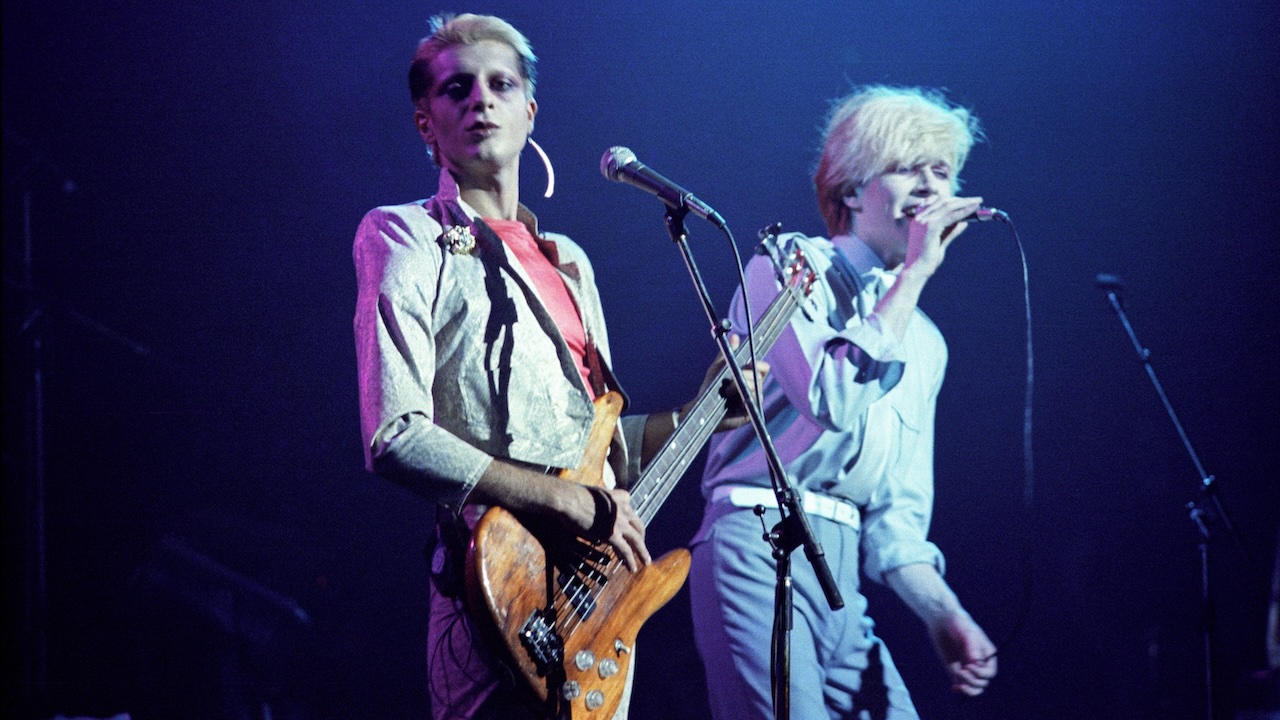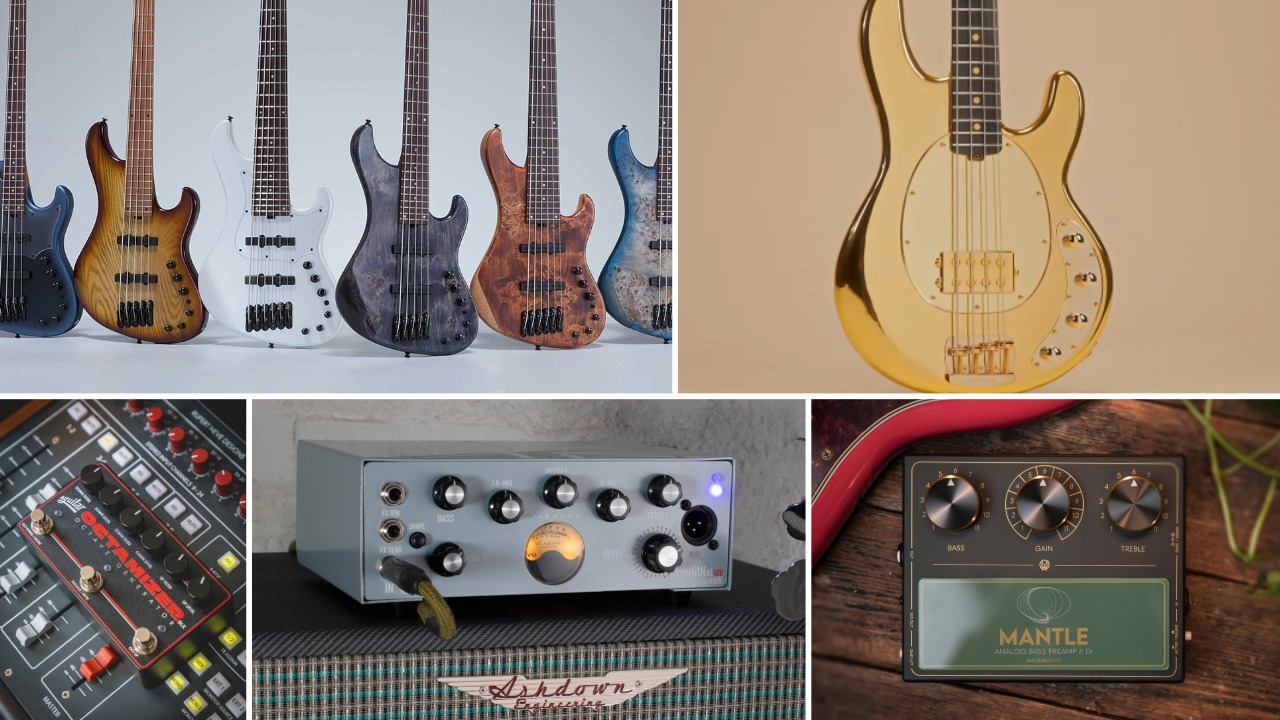“They just looked at each other like, ‘What the hell are we doing with this bass player?’” The late Mick Karn recalls his first tour with David Torn and Bill Bruford
Few electric bassists have a style as singular and strong as Japan’s fretless sorcerer

You might swear that bassist Mick Karn, who sadly succumbed to cancer in 2011 at the age of 52, learned to play bass guitar on another planet. His unusual playing style first took root during the 1980s with British art-rock band Japan, and went on to find full fruition on a half-dozen solo albums and challenging sideman dates with jazz musicians like trumpeter Mark Isham and guitarist David Torn.
“The first time I toured with David Torn was with Bill Bruford on drums and Mark Isham on trumpet,” Karn told Bass Player in 2006.
“There was one piece I was getting wrong every time, and they suddenly stopped me in the middle of the song and said, ‘Where your finger is now, can you move it up just one fret?’ To me, ‘up’ would be toward the headstick of the bass, which I did. And they just looked at each other like, ‘What the hell are we doing with this bass player?’
“I spoke to them about it later and told them how I felt because I didn't know anything about music! They envied me because I was going through the process of learning how to play, but I'd already found my voice, whereas they had started with theory and spent the next 10 years trying to find their own voice.”
The following interview is from the February 2006 issue of Bass Player, following the release of Karn's four-song EP Love's Glove.
How has your writing evolved?
“I've been moving toward a more positive, pop approach as opposed to the introspective, gloomy writing I tend to fall back on. I think my bass playing has evolved, also. It's a lot more confident and less worried about what is and isn't acceptable. I'm enjoying what I'm playing rather than trying to outdo what I did on the album before.”
All the latest guitar news, interviews, lessons, reviews, deals and more, direct to your inbox!
Given your radical bass playing style, I think many would assume you're one of the players least concerned with what is acceptable.
“I'd agree with that, but I didn't really mean what other people find acceptable, but what I find acceptable. It's true, though, and it's a terrible thing to say, but I spent too much time when I was young being told that this note can't be played with that one. I have very strong ideas about the way music should be written, and if it sounds good that's all that matters to me.”
You haven't studied theory and you don't read music. To what extent has that helped or hindered what you do?
“I think it's helped in many ways. First, when it comes to session or touring work where there's a wealth of material to learn, you tend to learn it faster when you don't have the music in front of you to rely on.”
“Second, every time I pick up the bass to write something, it feels like a new instrument. I don't know where the notes are, so I don't know what's going to come out when I actually play. It feels completely fresh every time.”
How selective are you when it comes to session work?
“I have always worked with sympathetic artists, such as Peter Gabriel and Kate Bush who realised that whatever I'm going to do is going to be weird. And luckily most people have wanted that, and given me a lot of freedom. My most recent session was for one of my favourite artists, Nusrat Fateh Ali Khan.
“I’ve always liked the idea of working within certain limitations, as long as they come directly from myself and not an outside source. The strangest sessions are always when I'd be asked along, I'd do a take, and then be asked if I could do my track in a conventional ‘normal’ style! Why ask me along to do that?”
What was it like touring with Japan?
“Touring with Japan was always a mixed bag; I was probably the only one who enjoyed it. David Sylvian hated it, absolutely hated it. The tours were never very long, about three or four weeks at a go, and we were supported all those years by success in Japan the country, which enabled us to tour elsewhere. Without that the band just would have dissolved.
“We were always disappointed by the fact that, when we would play big venues in Japan, the majority of the audience would be girls, screaming their heads off. As the success grew in Europe, to the point of our last tour, exactly the same thing was happening over here; it was full of screaming young girls and you begin to think, ‘Nobody's actually listening to what we're doing.’ And that made Dave feel even worse about touring, to the point of stopping completely.”
When you're creating your lines, certainly in the spontaneous elements that you do, is it easy to repeat them, or do you reinvent them?
“I think generally what happens is that I'll listen to a drum pattern, whatever that might be. I'm using one of these little keyboards which have pre-set rhythms in them, you know, Bossa Nova and so on, real rubbish equipment – and I've found that it doesn't matter what the rhythm is, as long as there's a rhythm there.”
“So I'll basically just listen to the rhythm and have a melody in my head before I actually pick up the bass. Somewhere between the melody and what I'm capable of playing, rhythmically, something happens! A lot of it is about decision making and the outcome is often best when there are least options.”



